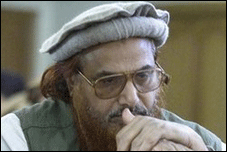|
|
|
Lashkar-e-Taiba leader Hafiz Saeed. |
Pakistan’s highest court has suspended hearings on the government’s appeal of the recent release of Lashkar-e-Taiba leader Hafiz Saeed.
The Supreme Court of Pakistan “indefinitely” suspended the government’s petition to have Saeed placed under house arrest yet again. No reason was given by the court for suspending the hearing.
The suspension took place just two days after India said it has turned over enough evidence to Pakistan to allow it to proceed with the prosecution of Saeed.
“The evidence provided in three dossiers is, in our view, sufficient to investigate role of Hafiz Saeed,” Indian Home Minister P. Chidambaram said.
In mid-December 2008, Saeed was placed under a loose house arrest after the United Nations Security Council declared the Jamaat-ud-Dawa both a terrorist entity and a front group for the Lashkar-e-Taiba. Saeed had been detained just weeks after the deadly terror assault on Mumbai in late November that had killed more than 170 people and locked down the city for more than 60 hours.
India has accused Saeed and Lashkar-e-Taiba of involvement in the Mumbai terror assault, and has presented evidence to Pakistan to aid in his prosecution.
Saeed was released on June 2, 2009, after a three-judge panel of the Lahore High Court said the Punjab provincial government and the federal government had failed to provide sufficient evidence to keep him in custody. The release of Saeed was celebrated in Pakistani jihadi circles and angered the Indians.
Background on Saeed and Lashkar-e-Taiba’s extensive links with al Qaeda and Pakistan’s military intelligence service
Saeed and the Laskhar-e-Taiba have strong links with elements within Pakistan’s military and the Inter-Service Intelligence agency, or ISI.
Osama bin Laden and his mentor Abdullah Azzam encouraged Saeed to form Lashkar-e-Taiba in the late 1980s, and helped fund the establishment of the terror outfit. Lashkar-e-Taiba, like al Qaeda, practices the Wahabi strain of Islam, and receives funding from Saudis and other wealthy individuals throughout the Middle East.
Lashkar-e-Taiba is an ally of al Qaeda; the two groups provide support for each other, and their operatives train in each other’s camps. Lashkar-e-Taiba has established training camps in Pakistan’s Northwest Frontier Province and the tribal areas, and also maintains camps in Pakistan-occupied Kashmir and the Northern Areas.
Lashkar-e-Taiba has an extensive network in Southern and Southeast Asia, where it seeks to establish a Muslim caliphate. The group essentially runs a state within a state in Pakistan; the group has established an organization that is as effective as Lebanese Hezbollah. Its sprawling Murdike complex, just northwest of Lahore in Punjab province, is a town of its own. Throughout Pakistan and Pakistan-occupied Kashmir, Lashkar-e-Taiba runs numerous hospitals, clinics, schools, mosques, and other services. In support of its activities, Lashkar is active in fundraising across the Middle East and South Asia, and the group has recruited scores of Westerners to train in its camps.
In 2005, the group succeeded in providing aid to earthquake-ravaged regions in Kashmir while the Pakistani government was slow to act. Most recently, Lashkar-e-Taiba provided relief to tens of thousands of internally displaced persons who have fled the fighting between the military and the Taliban in the Malakand Division.
Jamaat-ud-Dawa has long been known to be a front for the Lashkar-e-Taiba. Saeed renamed the Lashkar-e-Taiba as “Jamaat-ud-Dawa” in 2002 after Lashkar was supposedly banned by the Pakistani government.
In reality, Saeed and his leaders rebranded the group as a Muslim charity to mask the operations of Lashkar-e-Taiba. Saeed has been arrested several times by Pakistani security forces after attacks in India, but each time has been quietly released. After Mumbai, Pakistan claimed to shut down Lashkar-e-Taiba / Jamaat-ud-Dawa offices and camps, and detained followers, but the efforts were largely cosmetic.
The Lashkar-e-Taiba is one of the primary terror groups used by Pakistan’s Inter-Service Intelligence agency to direct military and terror operations inside India and Indian-held Kashmir. During the 1999 Kargil War, when Pakistan invaded Indian-held Kashmir, the Lashkar-e-Taiba fought as the vanguard for Pakistani forces in the mountainous region. To this day, Lashkar-e-Taiba military and terror units continue to infiltrate into Kashmir, with the help of Pakistan’s military.
Earlier this year, Lashkar-e-Taiba took credit for the fighting in Kupwara, and warned India of new attacks. “The gun battles should serve as a message to India that the struggle for Kashmir’s freedom is on with full vigour,” spokesman Abdullah Ghaznavi said in late March. Twenty-five Lashkar fighters and seven Indian soldiers were killed in the fighting.
India’s Army chief said Lashkar-e-Taiba still operates 40 to 50 camps in Kashmir and Pakistan.
Pakistan has never acted meaningfully against Lashkar-e-Taiba / Jamaat-ud-Dawa. On several occasions, Saeed was placed under house arrest and the government claimed to have shut down the group’s facilities. But the government would later quietly release Saeed and allow the reopening of the group’s offices and camps.









3 Comments
Having failed to produce justice in this case, my hopes that Chaudry’s court will do justice in the Sufi Mohammad case are diminished but not gone–yet.
The Thunder Run has linked to this post in the blog post From the Front: 08/04/2009 News and Personal dispatches from the front and the home front.
I suspect without seeing court docs. that there is a good possibility the enemy has infitrated the pakistani courts. I cannot emphasize enough how the integrity of the borders of pakistan, thus the government as well are in play. Thanks